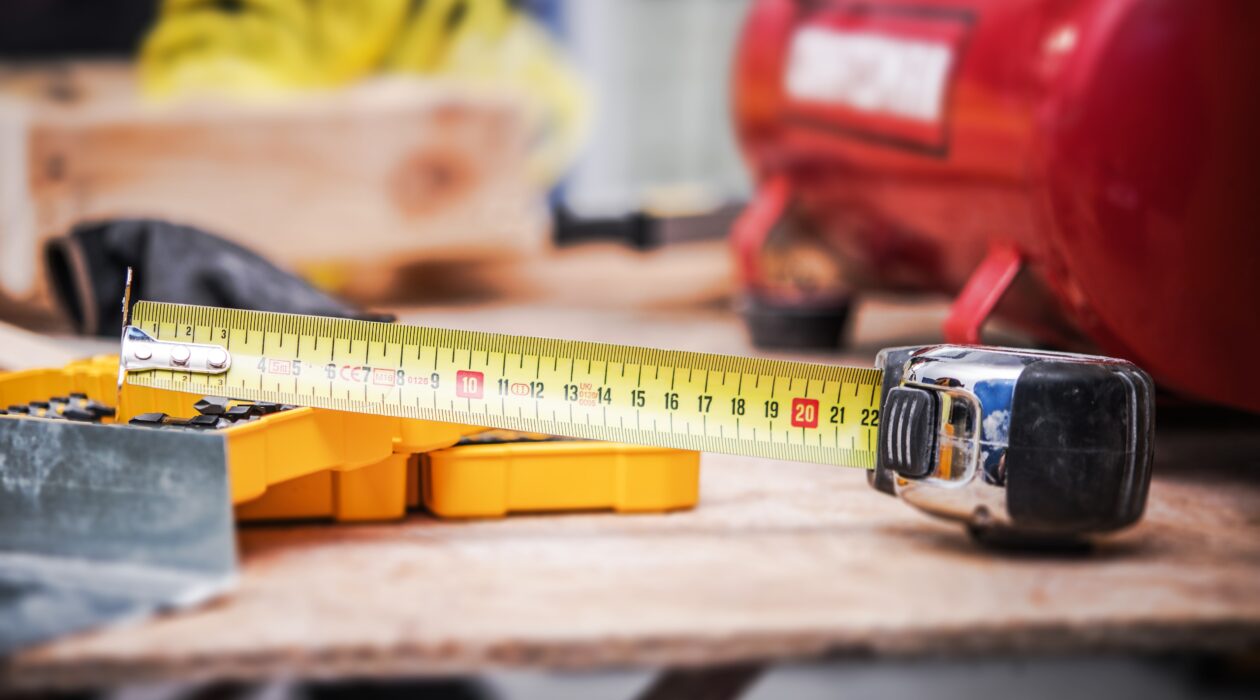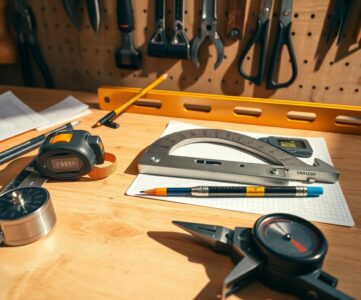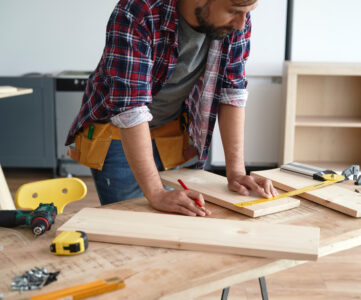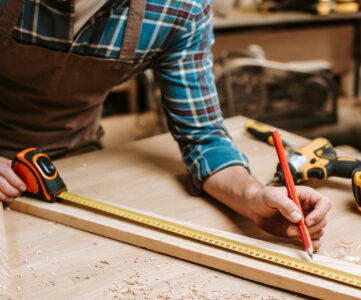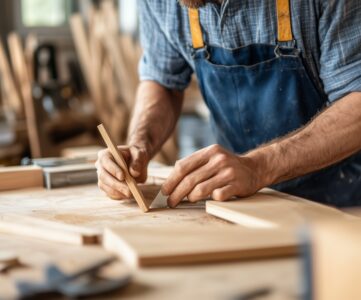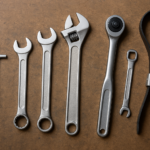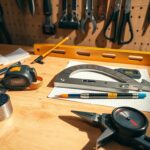In every successful DIY project, one thing is more important than power tools, fancy finishes, or even experience. It is the right measurement between the first mark on a rough piece of wood and the last alignment of a perfectly mounted shelf that distinguishes a clean result from a costly error. The amazing thing is that you don’t need electronic precision instruments or contractor-grade kits to get it right.
For under $50, you can set up with most of the best professional measuring and layout tools that DIYers use every day. The first part about these tools is that they are cheap; the second one is that they are multifunctional and easy to use regardless of whether you are a first-timer or a weekend veteran whose garage is full of projects. Of course, there is no shortage of tools on the market, but this article focuses on five tools that are budget-friendly and are most useful in different aspects.
If you ever tried to hang three picture frames without measuring them first or ended up with a crooked shelf because the wall “looked level,” you probably know: eyeballing is just not cutting it. The precision of these tools will not only help you with guessing but also with the start of true work—without making it realistic to affording a fortune.
1. Tape Measure (25-Foot)
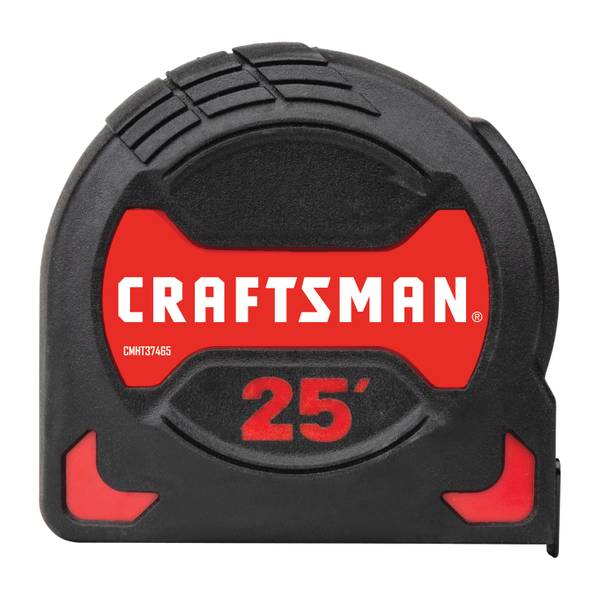
Estimation Price: $10–$25
At first, the tape measure seems trivial, but this is the very basis of every measuring task. A good one is a 25-foot tape; it is long enough for most indoor and outdoor jobs but also small enough to be carried. The best ones feature a rigid, standout blade (so it doesn’t collapse when measuring across longer spans), clear markings in both inches and millimeters, and a locking mechanism that holds your place while you jot down numbers or make a cut.
Whether you’re building a deck, cutting lumber for shelves, or spacing art evenly across a wall, a reliable tape measure is the one tool you’ll use again and again. It is impossible even for simple tasks—like checking if that new sofa will fit through the hallway—to be done without it. This is a must-have that should be found in every tool belt, drawer, or glove box.
2. Speed Square (7-Inch)
Estimation Price: $8–$15
Compact, lightweight, and endlessly handy, the speed square punches far above its size. On the surface, it’s a triangular ruler. But in action, it’s a layout guide, a saw fence, a protractor, and a straightedge—often all in the same cut. Made for marking perpendicular and angled lines on lumber, it’s also useful for checking squareness during framing, laying out rafters, or ensuring perfect alignment before fastening.
Its heavy-duty aluminum body resists wear and tear, and the etched measurement markings ensure readability even after heavy use. Even if you don’t do complex woodworking or construction, you’ll still find yourself reaching for it regularly when you need a quick and accurate reference.
3. Pocket Laser Distance Measurer
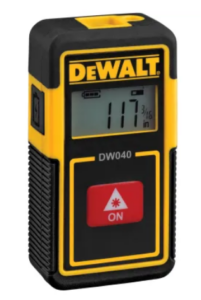
Estimation Price: $30–$50
While traditional tape measures work well for close-range jobs, laser distance measurers shine when you need speed and convenience. With just one button, a pocket-sized laser measurer can accurately record distances up to 40 feet without needing a second person to hold the other end. Many models also calculate area and volume automatically, making them especially helpful for estimating materials like paint, flooring, or drywall.
Despite the advanced tech, modern laser measurers have come down significantly in price over the last few years. Today, you can get a feature-packed, reliable device under $50—small enough to slip into your pocket, but accurate enough for renovation planning, real estate measurements, or large-space layouts.
It is a lifesaver on your own and is an absolute must-have for anyone upgrading rooms, organizing furniture layouts, or estimating renovation costs quickly and accurately.
4. Combination Square (12-Inch)
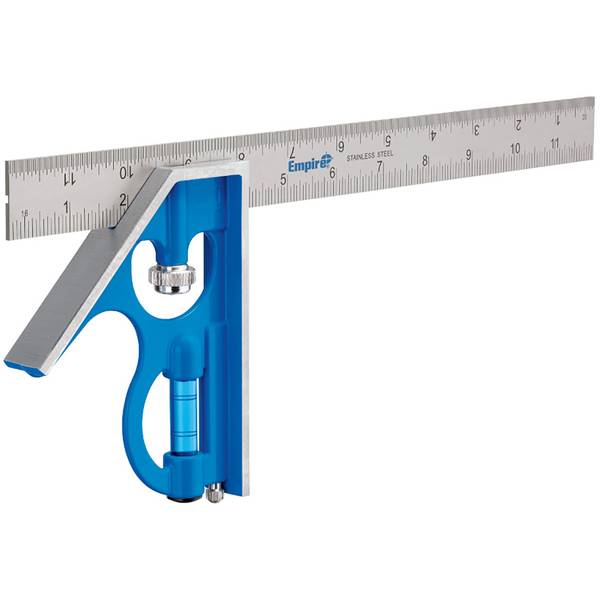
Estimation Price: $15–$30
This tool is a stylish layout tool that is like a Swiss Army knife the most. It comes with a sliding ruler, a 90-degree and 45-degree head, a built-in level, and often a scratch awl for marking points. Whether you’re working with wood, metal, or drywall, this tool helps you draw clean lines, check square angles, and verify straight cuts with confidence.
The 12-inch size is just right—it is long enough to work on medium-sized materials without being heavy. More precise than a speed square in a lot of cases, the combination square is the best choice for fine woodworking, cabinetry, and any project that has tight tolerances.
If everything goes well, it can make you cut down on waste, not to mention uneven cuts, and give a better finish and strength to your work. Even people who have been DIY-ing for years may reach for it when squaring up boards or verifying joint accuracy.
5. Contour Gauge Duplicator
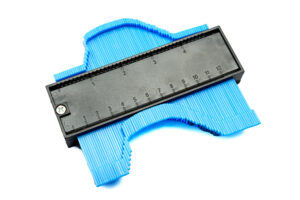
Estimated Price: $10–$20
Some DIY projects are not straight, and that is where the contour gauge comes in. When you have to copy an irregular shape (such as the notches in a baseboard, pipe cutouts, or moldings) the contour gauge allows you to press, copy, and transfer that profile to your workpiece. No guessing, no rough estimates.
By sliding the tool against the surface, the pins conform to the shape and lock in place, giving you a perfect match to trace onto your material. This is especially useful in finishing carpentry, flooring installation, tiling, or anywhere tight fits are essential. It saves a lot of time and Spares you the frustration of common trial-and-error trimming.
For less than $20, this tool can remarkably enhance the overall appearance of your final products and look much more professional—particularly in the case of working with tricky edges.
DIY Accuracy and Precision
The power of a tool in precision is the most neglected part of a DIY project. When measurements are off even just a bit, the ripple effects may be frustrating—misaligned corners, gaps, wasted materials, and extra hours of work. The wonderful news is that you don’t have to break the bank to solve the problem. The five tools mentioned above are your examples that through you can achieve absolute precision just like a professional even with a very small budget.
Whether you are undertaking a weekend project or are planning a major renovation, the most prudent decision remains the investment in correct measuring and layout tools. You will make fewer mistakes, lessen waste, and gain the courage to take on more complicated jobs.
Their only drawback is perhaps the following: their universal applicability. Each tool can be utilized in dozens—if not hundreds—of other jobs. A tape measure is not only for framing; it is for everything from measuring curtains to checking if that new appliance fits. A laser measurer can be of great help in your garage organization project the same way as it can be for your flooring project. A contour gauge can change your time-consuming job into an extraordinary one in no time.
As your skills in DIY projects grow, so will your understanding of how tools that make your work easier are of high value. But even if you don’t pass the level of only doing some improvements and decorating or furniture building, these essentials will always find their worth even for you.
Summary: 5 Measuring Tools That Deliver Big Value Under $50
• Tape Measure (25 ft) – A must-have for everyday measuring tasks
• Speed Square – Compact and multifunctional for layout and marking
• Pocket Laser Distance Measurer – Fast, solo-friendly digital measurements
• Combination Square (12 in) – Ideal for precise angles and straight lines
• Contour Gauge – Copy complex shapes for clean, accurate cuts
Measure Twice, Save Time, and Build with Confidence
A well-stocked toolbox isn’t necessarily costly; it just needs to be intelligent. These five tools are low-cost investments that will save you time, materials, and stress on every project. They make DIY projects not only easier but also more enjoyable. You’ll be building things you’re proud of instead of fixing mistakes most of the time.
So whether you’re hanging shelves or remodeling a room, start with accuracy—and the rest will fall into place.
